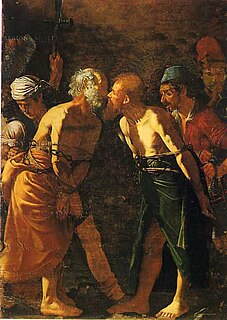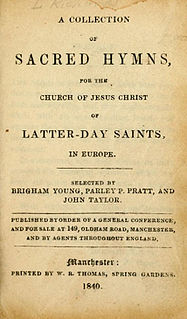
The epiclesis is the part of the Anaphora by which the priest invokes the Holy Spirit upon the Eucharistic bread and wine in some Christian churches.

The kiss of peace is an ancient traditional Christian greeting, sometimes also called the "holy kiss", "brother kiss", or "sister kiss". Such greetings signify a wish and blessing that peace be with the recipient, and besides their spontaneous uses they have certain ritualized or formalized uses long established in liturgy. Many denominations use other forms of greeting to serve equivalent purposes; they include handshakes, gestures, and hugs, any of which may be called a sign of peace.
"Tantum ergo" is the incipit of the last two verses of Pange lingua, a Medieval Latin hymn generally attributed to St Thomas Aquinas c. 1264, but based by Aquinas upon various earlier fragments. The "Genitori genitoque" and "Procedenti ab utroque" portions are adapted from Adam of Saint Victor's sequence for Pentecost. The hymn's Latin incipit literally translates to "Therefore so great".

The "Salve Regina", also known as the "Hail Holy Queen", is a Marian hymn and one of four Marian antiphons sung at different seasons within the Christian liturgical calendar of the Catholic Church. The Salve Regina is traditionally sung at Compline in the time from the Saturday before Trinity Sunday until the Friday before the first Sunday of Advent. The Hail Holy Queen is also the final prayer of the Rosary.

"Alma Redemptoris Mater" is a Marian hymn, written in Latin hexameter, and one of four seasonal liturgical Marian antiphons sung at the end of the office of Compline.

Steve Green is an American Christian music singer, notable for his tenor vocal range and flexible solo style. Over his 35-year career, Green has been honored as a four-time Grammy Award nominee, seven-time Dove Award winner and was inducted in to the Gospel Music Hall of Fame in 2017. He has had 13 No. 1 songs, and has sold over three million albums.

A Christian child's prayer is Christian prayer recited primarily by children that is typically short, rhyming, or has a memorable tune. It is usually said before bedtime, to give thanks for a meal, or as a nursery rhyme. Many of these prayers are either quotes from the Bible, or set traditional texts.

The Sinner's Prayer is an evangelical Christian term referring to any prayer of repentance, prayed by individuals who feel convicted of the presence of sin in their lives and have the desire to form or renew a personal relationship with God through Jesus Christ. It is a popular phenomenon in evangelical circles. It is not intended as liturgical like a creed or a confiteor, but rather, is intended to be an act of initial conversion to Christianity. While some Christians see reciting the sinner's prayer as the moment defining one's salvation, others see it as a beginning step of one's lifelong faith journey.
The Sursum Corda is the opening dialogue to the Preface of the Eucharistic Prayer or Anaphora in the liturgies of the Christian Church, dating back at least to the third century and the Anaphora of the Apostolic Tradition. The dialogue is recorded in the earliest liturgies of the Christian Church, and is found in all ancient rites.

The Divine Service is a title given to the Eucharistic liturgy as used in the various Lutheran churches. It has its roots in the pre-Tridentine Mass as revised by Martin Luther in his Formula missae of 1523 and his Deutsche Messe of 1526. It was further developed through the Kirchenordnungen of the sixteenth and seventeenth centuries that followed in Luther's tradition.
Preces are, in liturgical worship, short petitions that are said or sung as versicle and response by the officiant and congregation respectively. This form of prayer is one of the oldest in Christianity, finding its source in the pre-Christian Hebrew prayers of the Psalms in Temple Worship.
Jaroslav Vajda was an American hymnist.
Carolyn Winfrey Gillette is a hymn writer and Presbyterian pastor. Gillette and her husband Bruce are the co-pastors of Overbrook Presbyterian Church in Philadelphia, Pennsylvania since April 2017.

A Collection of Sacred Hymns for the Church of Jesus Christ of Latter-day Saints in Europe, informally known as the Manchester Hymnal, was first published in Manchester, England, in 1840. Like the first Latter Day Saint hymnal, this hymnal is text-only; it went through many editions, lasting until 1912 —future editions supposedly had extra hymns added, but the first few had 271.
Thanksgiving after Communion is a spiritual practice among Christians who believe in the Real Presence of Jesus Christ in the Communion bread, maintaining themselves in prayer for some time to thank God and especially listening in their hearts for guidance from their Divine guest. This practice was and is highly recommended by saints, theologians, and Doctors of the Church.
Good Friday Prayer can refer to any of the prayers prayed by Christians on Good Friday, the Friday before Easter, or to all such prayers collectively.

The Eucharist in the Lutheran Church refers to the liturgical commemoration of the Last Supper. Lutherans believe in the real presence of Christ in the Eucharist, affirming the doctrine of sacramental union, "in which the body and blood of Christ are truly and substantially present, offered, and received with the bread and wine."

Spiritual Communion is a Christian practice of desiring union with Jesus Christ in the Holy Eucharist. It is used as a preparation for Holy Mass and by individuals who cannot receive Holy Communion.
Holy Manna is the hymn tune originally written for "Brethren, We Have Met Together", which is one of the oldest published American folk hymns. Holy Manna is a pentatonic melody in Ionian mode. It was originally published by William Moore in Columbian Harmony, a four-note shape-note tunebook, in 1829, and is attributed to him.

Adaline Hohf Beery was an American author, newspaper and magazine editor, songbook compiler, as well as a hymnwriter. Born into a Pennsylvania Dutch community, her first job after graduating from Mount Morris College in Illinois was as a compositor in a printing office. She served as the editor of The Golden Dawn magazine and The Young Disciple child's paper; compiled a song-book, Gospel Chimes; and was employed by the Brethren Publishing House.











